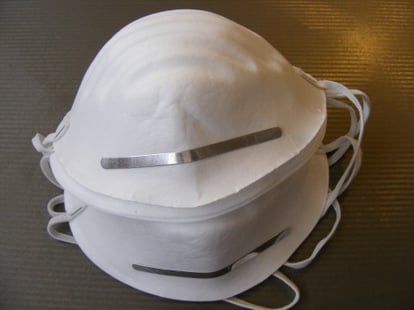Painters Respirators, Dust Masks, & Breathing Protection
Jeremy Holderness Occasionally I'll get a question from a homeowner about whether or not they should wear any type of breathing protection, and when.
Occasionally I'll get a question from a homeowner about whether or not they should wear any type of breathing protection, and when.
It's not a topic that's talked about often but maybe it should be. Perhaps the reason it's seldomly discussed is that most people don't even think about it, and those who do either don't think it's important or don't know which kind to buy.
I'm not suggesting that you should cover your face every time you roll some paint on your walls but there are absolutely some painting products that I wouldn't even consider exposing my lungs to without adequate protection. And sanding without one on my face isn't even an option. But breathing protection comes in so many different types, where do you begin?
Two Main Types of Breathing Protection
Although there are many more options available, for the purpose of this conversation we will talk about the two main types of breathing protection devices that you're likely to find at your local paint shop or big box store.
Disposable Particulate Respirators - A lot of people generically refer to these as "dust masks" but they can help to filter a little more than just dust. The majority of these masks are labeled 'N95' which means that, when properly fitted, they are 95% effective at filtering out solid particles and liquid aerosols that do not contain oil down to as small as .3 microns in size. That makes them a pretty good solution for filtering non-harmful dust from sanding, grinding, sawing, and insulation.
Where is that useful in the painting world, you might ask? If you're sanding drywall before painting, or wood trim before staining and varnishing then these will come in handy.
Particulate masks often come in a multi-pack or a box because they are disposable and should not be re-used on multiple projects or they will lose their effectiveness.
One upgrade I would consider when purchasing this type of respirator is to the valved-type with the little plastic box on the front of the mask. These valves are designed to release your hot, humid exhaled breath helping to prevent buildup of heat inside the respirator and make breathing considerably easier. If you've ever worn one of these things without the respirator feature while you're working you'll know exactly what I'm talking about.
If you're interested in purchasing a disposable respirator check out this chart from 3M that will help to make selecting the right one for your project easier.
Replaceable Cartridge Respirators - Made famous on the hit TV show, Breaking Bad, this type of respirator -- while considerably more expensive -- is hands-down more versatile, more effective, and more comfortable to wear. While they come in different styles, they're designed to hold replaceable filter cartridges and pre-filters that you can select based on what you're trying to protect your lungs from -- and their filtration is as much as 99.97% effective against solid particles and liquid aerosols, including oils.
Cartridges are available to protect you from mold, lead-based paint dust, organic vapor, as well as non-paint-related compounds. This type of respirator is a real life-saver when it comes to sanding or removing lead-based paint, repairing smoke/fire damage, cleaning mold & mildew, as well as spray applying paints, or working with specialty coatings that are particularly nasty like shellac-based products (e.g. BIN primer), polyurethanes, concrete stains, or epoxy garage floors.
If you're interesting in purchasing a replacable-cartridge respirator check out the options available from 3M for both the types of respirators and the cartridges that you'll need for your project.
Regardless of whether you're using a disposable or reusable respirator, always read the packaging carefully to determine which model you need for your particular application.
They're Much More Effective If They Fit
In the workplace where respirators are mandatory by an employer, an employee must be fit-tested to ensure proper fit, according to OSHA regulations. Voluntary use by employees or by the Do-It-Yourselfer do not require such fit-testing to be conducted, but it is still just as important that you have a good fit if you want your equipment to perform properly.
Generally speaking, a good fit means that the respirator will seal to your skin.
According to 3M's website, "A respirator can only work when air passes through the filter. Air will take the path of least resistance, so if the seal to the face isn’t secure, the air will go around rather than through the respirator.
Respiratory protection is often worn simultaneously with other personal protective equipment (PPE). Safety glasses, hearing protection, face shields, hard hats and coveralls can all vie with a respirator for real estate on a person’s face, head or body, and could interfere with the respirator’s seal.
Beards, mustaches, or even stubble interfere with the seal of a tight-fitting respirator. That’s why OSHA requires that employees be clean-shaven the day of the fit test and prohibits any facial hair in areas where the respirator comes into contact with the face."
It's probably not practical in most situations, or even necessary, for most homeowners to go through fit-testing procedures but if you're working with some products that give you reason for concern you can consult with the 3M website for more information on obtaining a test kit and instructions.
If you live in the Greater Tampa, FL area and need assistance with your painting project, please give us a call at (813) 570-8800 or visit our Contact Us page to schedule a free consultation and quote, or simply click on the button below to have us call you.
photo by: Emilian Robert Vicol / CC BY 2.0


